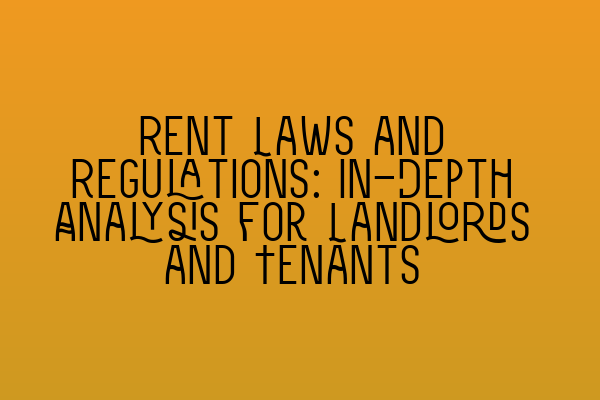Rent Laws and Regulations: In-Depth Analysis for Landlords and Tenants
As a landlord or tenant, it is vital to have a thorough understanding of the rent laws and regulations that govern the relationship between the two parties. These laws are in place to protect the rights of both landlords and tenants and to ensure fair and equitable treatment for all involved. In this blog post, we will provide an in-depth analysis of rent laws and regulations, covering key topics such as rent increases, eviction notices, and tenant rights.
Let’s start by discussing rent increases. Landlords have the right to increase rent, but there are certain legal restrictions they must adhere to. In most jurisdictions, landlords cannot increase rent arbitrarily and must follow specific guidelines. These guidelines typically include providing a written notice to the tenant a certain number of days in advance and limiting the percentage by which rent can be increased. Failure to comply with these guidelines can result in legal repercussions for the landlord.
On the other hand, tenants have the right to be informed about any rent increase and to challenge it if they believe it is unfair. It is essential for tenants to familiarize themselves with the specific laws in their area regarding rent increases to ensure they are being treated fairly by their landlords.
Next, let’s explore the topic of eviction notices. Landlords can initiate eviction proceedings under certain circumstances, such as non-payment of rent, violation of lease terms, or illegal activities on the premises. However, landlords must follow a legal process and provide tenants with a written eviction notice, usually with a specified notice period. This notice period allows tenants an opportunity to rectify any issues that may lead to eviction.
Tenants also have rights when it comes to eviction. They have the right to challenge an eviction notice if they believe it is unjust or if their landlord has not followed the proper legal procedures. It is crucial for tenants to understand these rights and seek legal advice if they are facing eviction.
Additionally, tenant rights encompass a wide range of protections. These may include the right to a habitable living environment, privacy, and proper notice of any changes to lease terms or rent increases. Tenant rights vary from jurisdiction to jurisdiction, so it is important for both landlords and tenants to familiarize themselves with the laws specific to their area.
As a landlord, it is crucial to ensure that you are knowledgeable about the rent laws and regulations relevant to your location. This understanding will help you avoid legal issues and provide a positive rental experience for your tenants. Legal resources, such as legal advice from a property lawyer or property management courses, can assist landlords in staying updated on the latest laws and regulations.
Similarly, tenants should be proactive in familiarizing themselves with their rights and responsibilities as outlined by the rent laws and regulations in their area. This knowledge will help tenants assert their rights and ensure a fair and respectful landlord-tenant relationship.
In conclusion, a thorough understanding of rent laws and regulations is essential for both landlords and tenants. Rent increases, eviction notices, and tenant rights are all critical aspects of the landlord-tenant relationship that require adherence to legal guidelines. By staying informed and seeking legal advice when necessary, both landlords and tenants can navigate the rental process with confidence and ensure a mutually beneficial experience.
For additional resources and helpful information on the SQE, visit these related articles:
-SQE 1 Practice Exam Questions
-SQE 1 Practice Mocks FLK1 FLK2
-SQE 2 Preparation Courses
-SQE 1 Preparation Courses
-SRA SQE Exam Dates
Remember, the more informed you are, the smoother your rental experience will be.
